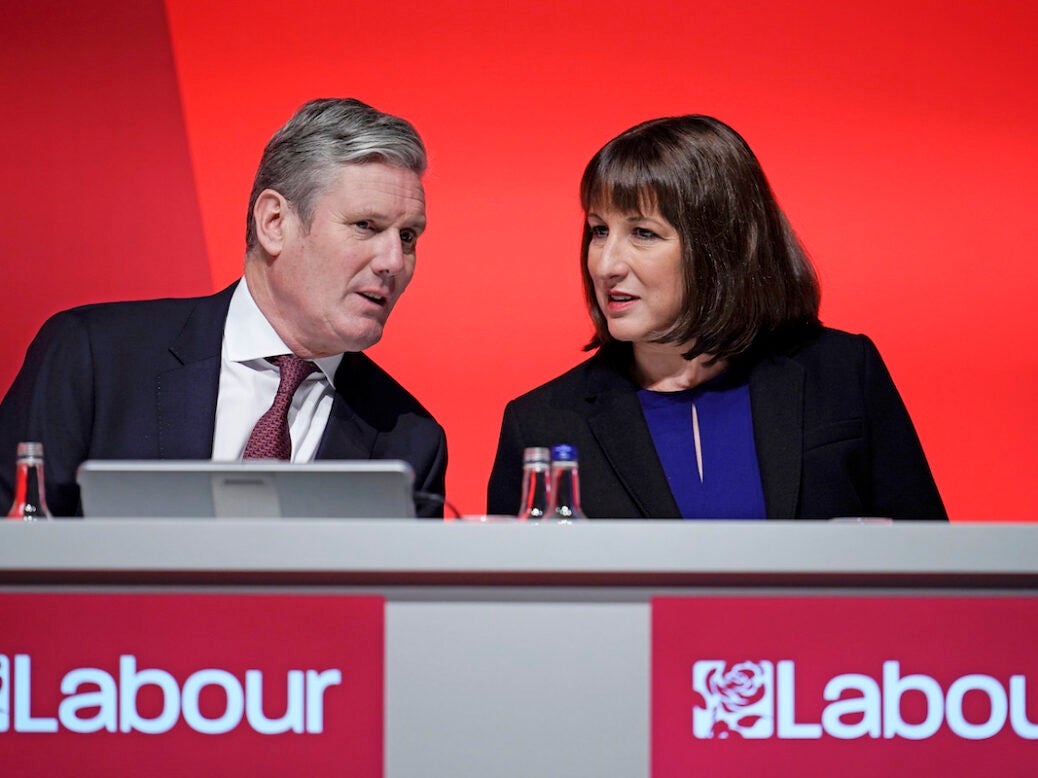
The UK parliament must dissolve by 19 December 2024, five years after it first sat seven days after the last general election. Polling usually takes place 25 working days after the dissolution, so – barring any extraordinary circumstances – a new government will be elected by 24 January 2025.
In practice, it’s likely to be quite a bit sooner. Politicians don’t want to be pounding the streets and knocking on doors in the rain and wind of winter with everyone’s minds on Christmas. Political journalists expect a late spring election, around May 2024.
The Labour Party has held a lead in the polls since December 2021, with a boost in October 2022 establishing a huge 20-point gulf between them and the Conservatives that has proved remarkably robust ever since. Polling analysis firm Electoral Calculus sets the probability of a Conservative majority at less than 1 per cent.
The country is overwhelmingly likely to have a Labour chancellor in place before long. What would that mean for Spear’s readers, the HNWs resident or holding interests in the UK, and those who advise them?
Every year at this time we ask our contacts in the tax industry – senior lawyers and advisers – exactly that question. This is what they had to say…
[See also: The 2023 Spear’s Tax & Trust Indices]
Time for a wealth tax?
In December 2020 the Wealth Tax Commission, a multi-disciplinary legal, academic and economic group based at the LSE, published a report recommending a one-off, non-repeating levy on large fortunes, with the stated aim of producing a lump sum to aid the economy’s recovery from the Covid crisis.
It was never endorsed by the Labour leadership but has been enthusiastically welcomed by a number of figures within the party and left-leaning commentators, reflecting support for a permanent tax on substantial assets.
Shadow chancellor Rachel Reeves recently said Labour had ‘no plans’ to introduce a wealth tax, saying she wants to grow the economy rather than increase taxation levels.
CHART 1
Given that politicians often change their minds, we asked our panel of tax experts for their opinions on wealth taxes. The group was fairly unequivocal in their opposition, but also far from unanimous (see chart 1). Twenty-four per cent of advisers saying a wealth tax is desirable is certainly a small minority and is well down from the peak of 48 per cent in 2021, but it is not nothing. Several of our respondents who indicate that the new tax would be a positive thing also note its political difficulty.
[See also: In defence of capitalism and free markets]
Our panel is more united when it comes to the practicality of a wealth tax. Fully three-quarters of them doubt it could be done, and just 12 per cent think the government would be able to administer it. In interviews, the most frequent reason given for this is the difficulty of definitively assessing the extent of an HNW’s wealth at any given time, especially if they are motivated to obscure the figure.
Reform over non-doms
The prime minister’s wife, Akshata Murty, did considerable damage to her husband’s political reputation when news reports emerged in 2022 of the large sums in international dividends coming to her on which she would not pay UK tax, as a result of her non-dom status. Labour has been clear that it would do away with current rules, replacing them with what Reeves called ‘a modern scheme for people who are genuinely living in the UK for short periods, to allow us to continue to attract top international talent’.
While it is not yet clear what the details of such a scheme would be, the Spear’s Tax Survey respondents are largely convinced that the system needs reform (see chart 2), and they are preparing their clients for change (see chart 3). Some respondents suggest shorter periods of non-domicile status, but more popular is the complete abolition of the non-dom category in favour of taxation based on residency and an end to the system of remittances (ie only having to pay tax on money brought into the UK). A new regime, it is suggested, might see limited exemption from taxation of any money brought into the country, in order to encourage inward investment.
CHART 2
‘The system needs to be completely reversed so that non-doms are encouraged to bring their funds into the UK for spending or investment at an acceptable rate of tax, without having to go through a forensic accounting exercise to work out what it is they are remitting,’ says Robert Brodrick of Payne Hicks Beach. Helen McGhee of Joseph Hage Aaronson agrees, saying: ‘The key is not to deter business investment.’
Many advisers note that HNWs are preparing to take up residence in other countries with more favourable rules, such as Italy.
CHART 3
‘Non-domiciled clients are those who are most able to vote with their feet and leave the UK,’ says James Heathcote of Sanctoras. ‘Although we are not seeing emergency departure preparations on the same scale as when a Corbyn government was a distinct possibility, clients are undoubtedly considering whether they should hedge their bets and not keep all their taxation eggs in the UK basket.’
Playing chancellor
None of our respondents consider far-reaching tax changes to be a strong likelihood before the election, as there is too little time. Asked to take on the role of chancellor and choose which taxes should rise or fall, the response was conservative, tending towards the status quo even where change might mean gains for some of their clients (see chart 4).
CHART 4
On balance, the view of our experts is that VAT, stamp duty and the top rate of income tax should stay where they are. There is some support for increased energy taxes and for capital gains tax to be closer to parity with income tax (the difference has been noted for some years in the Spear’s Tax Surveys). Corporation tax and inheritance tax are the taxes that are in most need of a reduction, according to respondents.
James Quarmby of Stephenson Harwood would prefer to do away with inheritance tax altogether. ‘IHT should be abolished,’ he says. ‘It’s an unfair tax and, in any event, only brings in about £6 billion per annum.’
[See also: Choosing the right private client wealth management for you]
Many in the group see inheritance tax as so easily avoidable that it unfairly penalises those who have the fewest resources to avoid it. Chris Moorcroft of Harbottle & Lewis proposes reform: ‘[I] wouldn’t necessarily put it up, but would consider a gift tax similar to that which many other countries currently have, as avoiding inheritance tax is relatively easy in the UK.’
Andrew Goldstone of Mishcon de Reya advises caution at such a turbulent economic time, even if squeezing a few more pounds out of the rich might be good politically for an incoming Labour government: ‘You don’t generally raise large sums by increasing capital taxes or increasing the top rate of income tax. The only way to raise large sums is to tax huge numbers of lower- and middle-income taxpayers a little bit more, either through frozen tax allowances or increasing VAT. Now is not the time to do that with the cost-of-living crisis.’
Winds of change
The majority of our advisers agree that now is the time to prepare for a new government (see chart 5), but for HNWs that preparation mostly comes in the form of exploring the possibilities of an international move, dispersing assets down the generations earlier rather than later, and keeping a watching brief on emerging tax plans. Some are modelling the impact of possible scenarios on their clients, while others are advising calm, as any government will move slowly to do anything radical.
CHART 5
The infernal revenue?
Moving from economics to the daily workings of the tax machine itself, our survey gave rise to a number of reports of frustration when dealing directly with HMRC. Probate is taking even longer than usual to settle, queries go unanswered, and staff are less likely to know the answers to technical questions than might previously have been expected.
None of our respondents rated the Revenue’s performance when dealing with HNW matters as ‘good’ or ‘very good’, and 49 per cent chose ‘poor’ or ‘very poor’ (see chart 6). The problems are largely ascribed to underfunding and staff cuts.
‘Unfortunately not enough bums on seats – seriously under-resourced,’ says McGhee. ‘They are trying their best but need more expert staff to deal with complex matters,’ says Philip Whitcomb, who recently joined Clarke Willmott from Moore Barlow.
CHART 6
Roger Holman of Blick Rothenberg adds: ‘Service levels are woeful as they have had staffing cuts for years. It is clear that successive governments do not look at the return on investment that could be gained by investing in the department.’ HMRC did not respond to a request for comment.
When we come to write the 2024 Spear’s Tax Survey report, it is likely the election will have played itself out and there will be more certainty about the future as the chancellor lays out their plans, be it Rachel Reeves, Jeremy Hunt or someone else. We will again consult our address books and ask the country’s best advisers what they think and how the tax landscape is shifting.
Three leading tax accountants

Rebecca Durrant looks to ‘build something valuable, substantial and enduring’ through her work with clients. Over the course of her career, she has advised on capital gains tax, inheritance tax and non-resident UK tax issues.

Having worked at BDO for more than 17 years, Dawn Register is renowned for her work in voluntary disclosures and tax investigations. She frequently works alongside HMRC to resolve tax disputes, which often have a cross-border element.

Iain Younger specialises in providing tax-efficient solutions to complex problems. He has deep knowledge and experience of the complications and obligations that arise for international clients with a business or personal connection to the US.
Three tax lawyers to call on
Robert Brodrick, Payne Hicks Beach

With a global client base that includes HNWs and families in the Middle East, the US and the UK, Robert Brodrick, chair of Payne Hicks Beach’s management board, is well regarded for his ‘sensitive handling of complex situations’.

When it comes to tax planning for non-doms, Cohen is Farrer’s go-to man. He has more than two decades’ experience in advising on complex tax issues and works with the immigration team to advise international HNWs, entrepreneurs and investors.

Camilla Wallace is praised by clients for her straight-talking approach. ‘I translate complex areas of the law into plain English,’ she says. She has experience in offshore and onshore trust structuring, lifetime tax planning, inheritance tax and wills.







